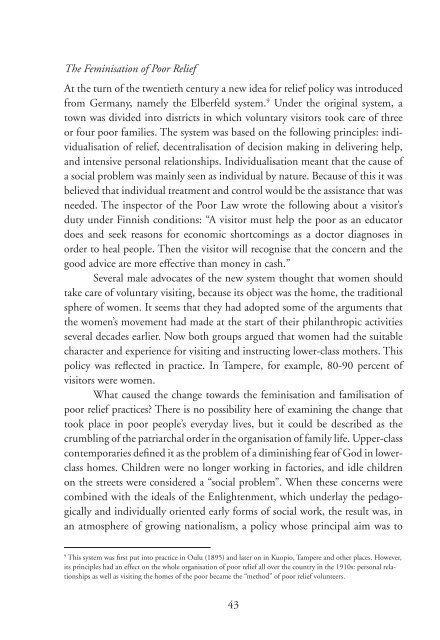Teaching Gender in Social Work - MailChimp
Teaching Gender in Social Work - MailChimp
Teaching Gender in Social Work - MailChimp
Create successful ePaper yourself
Turn your PDF publications into a flip-book with our unique Google optimized e-Paper software.
The Fem<strong>in</strong>isation of Poor Relief<br />
At the turn of the twentieth century a new idea for relief policy was <strong>in</strong>troduced<br />
from Germany, namely the Elberfeld system. 9 Under the orig<strong>in</strong>al system, a<br />
town was divided <strong>in</strong>to districts <strong>in</strong> which voluntary visitors took care of three<br />
or four poor families. The system was based on the follow<strong>in</strong>g pr<strong>in</strong>ciples: <strong>in</strong>dividualisation<br />
of relief, decentralisation of decision mak<strong>in</strong>g <strong>in</strong> deliver<strong>in</strong>g help,<br />
and <strong>in</strong>tensive personal relationships. Individualisation meant that the cause of<br />
a social problem was ma<strong>in</strong>ly seen as <strong>in</strong>dividual by nature. Because of this it was<br />
believed that <strong>in</strong>dividual treatment and control would be the assistance that was<br />
needed. The <strong>in</strong>spector of the Poor Law wrote the follow<strong>in</strong>g about a visitor’s<br />
duty under F<strong>in</strong>nish conditions: “A visitor must help the poor as an educator<br />
does and seek reasons for economic shortcom<strong>in</strong>gs as a doctor diagnoses <strong>in</strong><br />
order to heal people. Then the visitor will recognise that the concern and the<br />
good advice are more effective than money <strong>in</strong> cash.”<br />
Several male advocates of the new system thought that women should<br />
take care of voluntary visit<strong>in</strong>g, because its object was the home, the traditional<br />
sphere of women. It seems that they had adopted some of the arguments that<br />
the women’s movement had made at the start of their philanthropic activities<br />
several decades earlier. Now both groups argued that women had the suitable<br />
character and experience for visit<strong>in</strong>g and <strong>in</strong>struct<strong>in</strong>g lower-class mothers. This<br />
policy was reflected <strong>in</strong> practice. In Tampere, for example, 80-90 percent of<br />
visitors were women.<br />
What caused the change towards the fem<strong>in</strong>isation and familisation of<br />
poor relief practices? There is no possibility here of exam<strong>in</strong><strong>in</strong>g the change that<br />
took place <strong>in</strong> poor people’s everyday lives, but it could be described as the<br />
crumbl<strong>in</strong>g of the patriarchal order <strong>in</strong> the organisation of family life. Upper-class<br />
contemporaries def<strong>in</strong>ed it as the problem of a dim<strong>in</strong>ish<strong>in</strong>g fear of God <strong>in</strong> lowerclass<br />
homes. Children were no longer work<strong>in</strong>g <strong>in</strong> factories, and idle children<br />
on the streets were considered a “social problem”. When these concerns were<br />
comb<strong>in</strong>ed with the ideals of the Enlightenment, which underlay the pedagogically<br />
and <strong>in</strong>dividually oriented early forms of social work, the result was, <strong>in</strong><br />
an atmosphere of grow<strong>in</strong>g nationalism, a policy whose pr<strong>in</strong>cipal aim was to<br />
9<br />
This system was first put <strong>in</strong>to practice <strong>in</strong> Oulu (1895) and later on <strong>in</strong> Kuopio, Tampere and other places. However,<br />
its pr<strong>in</strong>ciples had an effect on the whole organisation of poor relief all over the country <strong>in</strong> the 1910s: personal relationships<br />
as well as visit<strong>in</strong>g the homes of the poor became the “method” of poor relief volunteers.<br />
43

















